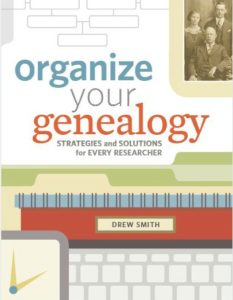 Librarian and genealogist Drew Smith offers advice in his book, Organize Your Genealogy: Strategies and Solutions for Every Researcher.
Librarian and genealogist Drew Smith offers advice in his book, Organize Your Genealogy: Strategies and Solutions for Every Researcher.
Reviewed by JAMES PYLANT
“Your mind is without a doubt your most important research tool,” says Drew Smith. “Genealogy is nothing if not a mental game, so you’ll need to take care to do your best work.” Indeed. It’s difficult to succeed as a researcher when your concentration suffers from not being mentally alert, decision fatigue, following poor routines, and trying to function in a disorganized workspace. These are issues he takes head on in the book’s first chapter.
While Organize Your Genealogy targets new genealogists—encouraging them to develop good habits as they launch into this fascinating hobby—it also aids more advanced researchers who need to take a second look at how they’re managing projects. As the author says, “this book can benefit anyone who needs to work with large amounts of information.” To be successful as genealogists, we must manage large amounts of data—whether it’s paper or electronic—which we need to easily access to analyze, arrange, and compile.
Smith’s chapter on organizing files is especially interesting to me because it addresses storing research, a task we must all face and not postpone. The author says, “In my opinion, the most common question when it comes to organizing research is ‘How do I organize my genealogical files?’” And while there’s no perfect answer, our organizational scheme must be one that allows for easy access. Smith explores genealogical numbering systems and decisions about paper vs. electronic (or both). He recommends that researchers strive for as much back-up electronic filing as possible, based on comfort level, because paper files are always vulnerable to loss due to misfiling, disasters, or theft. In this chapter, the author discusses selecting options for electronic storage.
Other helpful chapters cover managing research workflow, organizing communication (from email to social media accounts); keeping track of online searches; planning research trips; choosing genealogical lectures, conferences, and webinars; and organizing volunteering—your chance to give back to the community. Each chapter equally provides sound detailed advice about every facet of organization for the genealogist. “Becoming better organized is a journey, not a destination,” says Smith.
Organize Your Genealogy: Strategies and Solutions for Every Researcher. By Drew Smith. Softcover, 242 pp., illustrated. Published by Family Tree Books, Cincinnati, Ohio. Also available from Amazon (affiliate link).
Book Review and Material Connection Disclosure: GenealogyMagazine.com receives complimentary copies of books with the understanding that they will be considered for review without compensation. Some of the links published on this site are “affiliate links,” meaning that if a site user clicks on the link and purchases the item, GenealogyMagazine.com will receive an affiliate commission. Regardless, we will only recommend products or services that we would personally use and believe will add value to our readers. We are disclosing this in accordance with the Federal Trade Commission’s 16 CFR, Part 255: “Guides Concerning the Use of Endorsements and Testimonials in Advertising.”
